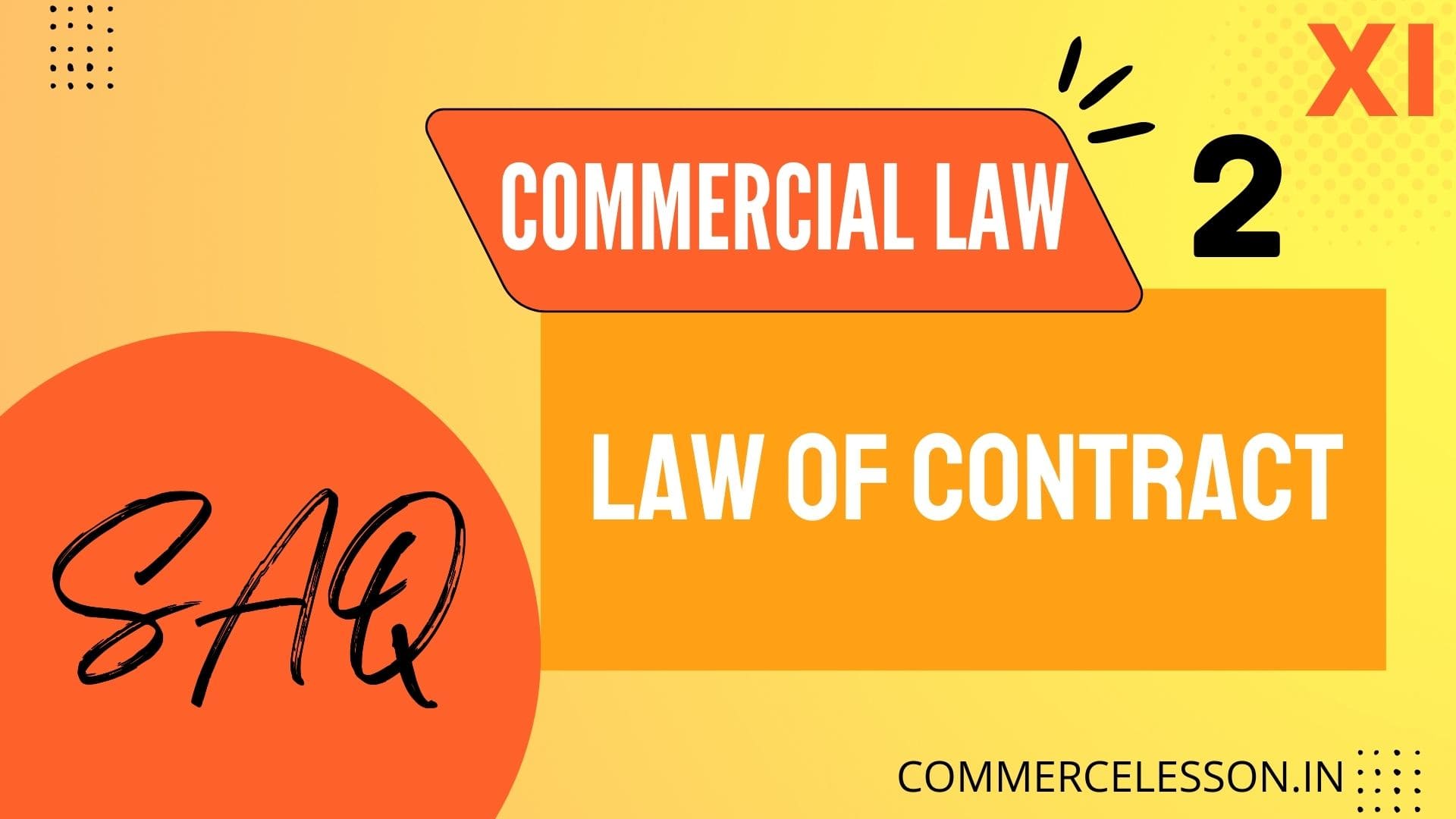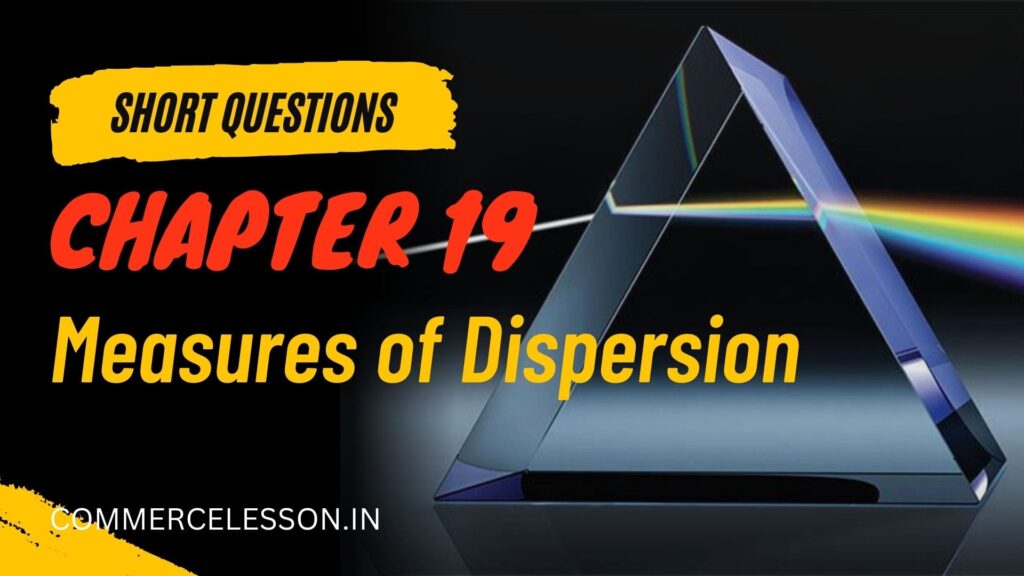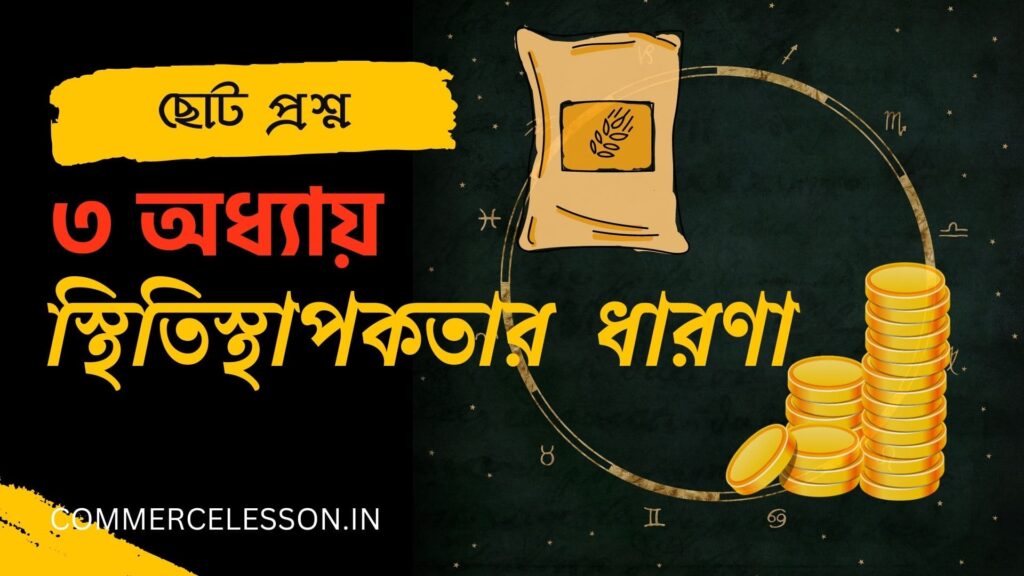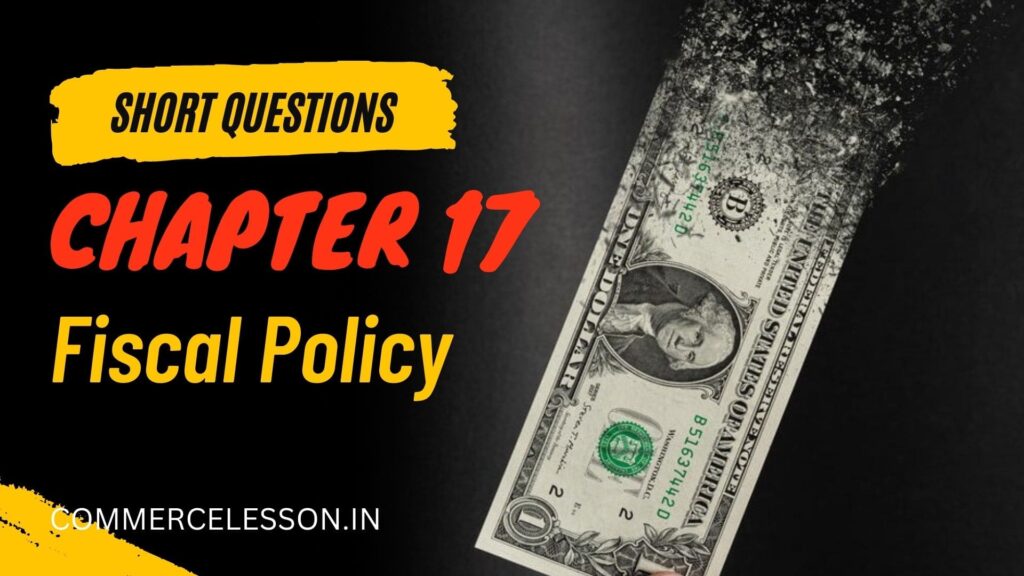Short Answer Type Questions (SAQ) [ 1 Mark each ]
1. What is Public law?
Answer: Laws relating to the constitutional and administrative powers of the State and laws governing the relationship between the State and individuals are public laws.
2. What is Private law?
Answer: The law by which a person can establish and enforce his rights to another person is called private law. Contract law and Property law are examples of private law.
3. Define Contract.
Answer: As per Section 2(h) of the Indian Contract Act, an agreement enforceable by law is a contract.
4. Mention two objectives of Contract Act?
Answer: Two objectives of Contract Act are –
(i) Creation of liability as per the promise,
(ii) Remedies for failure to perform the contract
5. What do you mean by Agreement?
Answer: According to Section 2(e) of the Contract Act, one or more promises made by way of consideration between two parties to a contract are called agreement.
6. Mention two elements of agreement. [2016]
Answer: Two elements of agreement are – (i) Two parties, (ii) Offer and acceptance.
7. What do you mean by Social agreement?
Answer: In social life, agreement given by neighbours, friends, relatives, etc. is called social agreement. Acceptance of invitation constitutes such agreement. It is not enforceable by law.
8. What do you mean by Legal agreement?
Answer: Agreements that result in contracts and which are enforceable by law are called legal agreements. Agreements to buy and sell are legal agreements.
9. What is an invalid contract? [2019]
Answer: A contract that is not enforceable by law is called invalid contract.
10. State any one point difference between ‘Contract’ and ‘Agreement’. [2018]
Answer: Agreement arises from one or more promises made by way of consideration between two parties. This agreement may not be enforceable by law. On the other hand, an agreement that is enforceable by law is a contract.
11. What is Voidable contract? [2015]
Answer: Agreements that are enforceable at the will of one party but not at the will of the other are voidable contracts.
12. Give two examples of Voidable contracts. [2014]
Answer: Two examples of voidable contracts –
(i) Aman contracts to purchase Biman’s Car by force is a voidable contract.
(ii) Aman made a contract with Biman by misrepresentation. It is also a voidable contract.
13. Define Void contract.
Answer: According to Section 2(j) of the Contract Act, if the contract becomes legally enforceable at the time of the contract but later becomes unenforceable for any reason, it is called a void contract.
14. What is Express contract?
Answer: If all the parties to the contract agree in writing or verbally to fulfill the terms of the contract at the time of making the contract, then it is called express contract.
15. What is Implied contract? [2014, 2022]
Answer: If the offer and acceptance at the time of formation of the contract are acknowledged by the conduct or behaviour of the parties to the contract rather than in writing or verbally, then it is called an implied contract.
16. Give an example of Implied contract. [2018]
Answer: A passenger boarded the bus for transportation. In this case, the passenger has accepted by his behaviour the offer of a fixed bus fare. As a result, an implied contract is created.
17. What do you mean by Executory contract?
Answer: An executory contract is a contract whose terms have not yet been executed but will be executed in the future.
18. What do you mean by Quasi contract? [2014, 2022]
Answer: Under Sections 68 to 72 of the Contract Act, in certain cases, contract is enforceable even if there is no contract. This is called Quasi contract. In such a contract, if one of the parties to the contract is entitled to receive something from the other party, the court can compel the other party to pay even if there is no contract.
19. Give an example of Quasi contract. [2016]
Answer: Example of a quasi contract :
At Jim’s shop, Jame mistakenly left the product he had purchased. In this case, Jim’s job is to return the product to Jame or refund the price of the product. It is assumed that a relationship has been created between them even though there is no contract. This is a quasi-contract.
20. What is Contingent contract?
Answer: According to Section 31 of the Contract Act, a contract in which the performance or non-performance of an act depends on the occurrence or non-occurrence of an event incidental to the contract is called a contingent contract.
21. Define Unenforceable contract.
Answer: When a contract cannot be legally enforced by a court due to defects, it is called an unenforceable contract.
22. State two essential elements of contract.
Answer: Two essential elements of contract are – (i) Offer and acceptance, (ii) Consideration.
23. What do you mean by Offer? [2017]
Answer: According to Section 2(a) of the Indian Contract Act, when a person expresses to another person an intention to do or refrain from doing something and the intention is to obtain the agreement of the other person, it is called an offer.
24. Who is called the offerer?
Answer: According to Section 2(c) of the Contract Act, the person who makes the offer between the two parties of the contract is called the offerer or proposer.
25. Who is called the offeree?
Answer: If the person to whom the offerer makes the offer accepts the offer, the person concerned is called the offeree.
26. What is a promise? [2016]
Answer: When the other party agrees and accepts the offer of one party to the contract, the offer is accepted and called a promise.
27. What do you mean by Specific offer?
Answer: When an offer is made to a specific person, it is called a specific offer.
28. Give two examples of invitations to make an offer.
Answer: (i) The products are arranged by writing the price in the shop; and
(ii) Any advertisement published in newspaper.
29. What is Implied offer? [2015]
Answer: An offer expressed by behaviour is called an implied offer.
30. Define Acceptance. [2019]
Answer: According to Section 2(b) of the Indian Contract Act, if the person to whom the offer is made accepts the offer, it is said to be an acceptance.
31. What is Implied acceptance? [2022]
Answer: When the offeree accepts the offer through behaviour it is called implied acceptance. Acceptance is given by hammering at the auction which is considered implied acceptance.
32. What is Express acceptance?
Answer: When an acceptance is expressed verbally or in writing or actively by an act, it is called expressed acceptance.
33. When acceptance is complete in the case of offerer?
Answer: Communication of acceptance is completed in the case of the offerer as soon as the offeree sends the news of acceptance to the offerer.
34. When acceptance is complete in the case of offeree?
Answer: As soon as the news of acceptance reaches the offerer’s notice, the communication of acceptance is completed in the case of the offeree.
35. What do you mean by Revocation of offer?
Answer: Under Section 6 of the Indian Contract Act, an offer is deemed to be revoked or void in certain circumstances. Such as withdrawal by notification, expiry of acceptance period, offerer death or insanity before acceptance, etc. However, the offer can be withdrawn at any time before acceptance.
36. Can an offer be revoked after acceptance?
Answer: Once acceptance of an offer is complete in the case of the offerer, the offer cannot be revoked.
37. State two modes of revocation of an offer.
Answer: (i) If the offerer withdraws the offer by notice before the news of acceptance reaches the offerer; and
(ii) If the offeree does not fulfill the preconditions for acceptance, the offer is revoked.
38. Can acceptance of an offer be conditional?
Answer: No. No condition shall be included in the offer which, if not complied with, shall be deemed to have been accepted.
39. What is Consideration? [2017]
Answer: ‘Consideration’ means ‘something in return’. The exchange of something between the parties to the contract is called consideration under the Contract Act.
40. “Past consideration is no consideration.” Give opinion. [2014]
Answer: Past consideration is also considered consideration in Contract law. That is, past, present, future consideration is also legal consideration as per the Contract Act.
41. What are the provisions of contract law regarding adequacy of compensation? [2015]
Answer: Consideration need not be adequate to the promisee but it must be of some value in the eye of law.
42. Mention any two cases where a contract is without consideration.
Answer: Two cases where contract exist without consideration are –
(i) In case of love and affection;
(ii) Compensation for voluntary service.
43. Give two examples of persons incapable of performing a contract.
Answer: Two persons who are incapable to perform the contract are – minor and lunatic.
44. Who is a minor under Indian law? [2019]
Answer: As per Section 3 of The Indian Majority Act, 1975, a person who has not completed 18 years of age is considered a minor.
45. Can a minor execute contracts?
Answer: As per Section 11 of the Contract Act, no one can enter into a contract unless he is an adult.
46. Why a minor cannot be declared bankrupt?
Answer: As a minor is incapable of contracting, he cannot enter into any contract relating to his debts.
47. Who is called a person of unsound mind?
Answer: A type of incapacity due to mental impairment is brain malformation, which is considered a bar to contract. Persons having such incapacity are called persons of unsound mind. Such as lunatic person, idiocy person, etc.
48. Give two examples of persons of unsound mind.
Answer: (i) Lunatic or mad, (ii) Idiocy person.
49. What is Future consideraton? [2015]
Answer: When a consideration to contract is promised to be paid in the future, it is called future consideration executory consideration.
50. Define Free consent. [2017]
Answer: According to Section 14 of the Contract Act, consent is said to be free consent if it is not induced by coercion, undue influence, fraud, misrepresentation and mistake.
51. When a consent be called free consent?
Answer: If a party does not obtain the consent of the other party by coercive, undue influence, fraud, misrepresentation, and mistake, then the consent given by the other party is said to be free consent.
52. Is free consent necessary for a legal contract?
Answer: According to Section 10 of the Indian Contract Act, those agreements are said to be contracts in which the parties to the contract voluntarily consent to it.
53. What is Coercion? [2016]
Answer: According to Section 15 of the Indian Contract Act, if a person commits any act prohibited under the Indian Penal Code or unlawfully detains or intimidates another person to compel him to enter into a contract, it is called coercion.
54. What is meant by Undue influence? [2017, 2019]
Answer: According to Section 16(i) of the Indian Contract Act, if there is such a relationship between the parties to the contract that one party can dominate the other party and take advantage of it unfairly, it is called undue influence.
55. Mention two probable areas of the presence of undue influence. [2014]
Answer: (i) Undue influence on money lending transactions;
(ii) Contract with veiled woman.
56. What do you mean by misrepresentation?
Answer: According to Section 18 of the Contract Act, if the offerer of the contract does not make a correct statement to the offeree about the subject matter of the contract, even though the offerer knows the correct statement, it is called misrepresentation.
57. Mention two types of misrepresentation.
Answer: (i) Positive assertion and (ii) Breach of duty.
58. When the affected party from misrepresentation fails to get any remedy?
Answer: If the affected party takes any contractual benefit after knowing the misrepresentation and where the affected party fails to do so even though it is possible for him to know the actual truth by ordinary efforts, then the affected party fails to get any remedy?
59. What are the consequences of contract in case of misrepresentation?
Answer: Consequences of contract in case of misrepresentation are –
(i) The affected person can cancel the contract if he wants; or
(ii) The affected party can compel the other party to perform the contract if he wishes.
60. What is Fraud? [2018]
Answer: Fraud is any act by one party intended to deprive or cheat other party of his right to a contract.
61. Mention two such acts that are considered fraud.
Answer: (i) Implying something as true even though it is not; and
(ii) Do any act with intent to deceive.
62. State two consequences of fraud.
Answer: Two consequences of fraud are –
(i) The defrauded party can rescind the contract;
(ii) The defrauded party can compel the other party to perform the contract.
63. Mention two cases where silence is considered to be fraudulant.
Answer: (i) Silence is considered to be fraudulant where speaking is desirable given the circumstances.
(ii) Silence can be considered to be fraudulant where the silence is a way of speaking given the circumstances.
64. Define Mistake.
Answer: According to the Indian Contract Act, if a party or both parties enter into a contract under any misapprehension about the subject matter, nature, terms, etc. of the contract, it is said to be a mistake.
65. What is Unilateral mistake? [2016]
Answer: A unilateral mistake occurs when one of the parties to the contract enters into the contract based on a misapprehension about the essential elements of the contract.
66. What is meant by Bilateral mistake? [2018]
Answer: When there exists a misapprehension between the parties about the material facts of the agreement at the time of entering into an agreement, it is called a bilateral mistake.
67. What is the consequence of an agreement on the ground of a bilateral mistake?
Answer: An agreement on the ground of a bilateral mistake is void under Section 20 of the Contract Act.
Liked our post?
We are available with lots and lots of commerce-related content.





[…] Chapter 2 : Law of Contract | Short Answer Type Questions (SAQ) | CLPA | WBCHSE | Class 11 […]